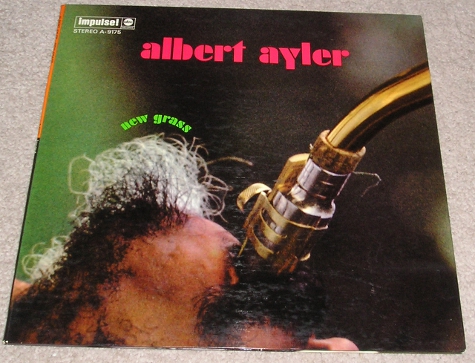
Albert Ayler – New Generation
Albert Ayler – Sun Watcher
Albert Ayler – Free At Last
In a career that is filled with challenging, searing, provoking work, this album, released in 1968, was probably the most radical and avant-garde thing that saxophonist Albert Ayler ever produced. When it was released, it seems a lot of his core fans felt he was “selling out” by employing R&B and Funk rhythms. Much like Miles Davis’ On The Corner, another record that faced the same accusations, this couldn’t be farther from what the music actually represents. The songs on New Grass were an attempt at a real fusion of styles and while that may have been to court new audiences, this fusion was entirely on the artist’s terms. I’m not sure why anyone would have thought this music would be “sell-out” music. Yes, it has a funky rhythm, there are some soulful back-up singers, but listeners still have to contend with the otherworldly saxophone of Ayler.
“New Generation” is a perfect example, the beat is seriously driving, with Bernard Purdie doing his usually solid thang on the skins, the theme of the song is certainly very peace, love and hippie-fied, but still that saxophone cuts through and (especially towards the end) goes places few other jazz players could and definitely where no soul or funk horn player would consider going. This is especially the case with the best song on the album, the instrumental “Sun Watcher” which begins as if it might be a “standard” Ayler spiritual before shifting into a madly funky beat with Ayler’s soulful then completely out-there workout on the sax riding on top. “Free At Last” shows Albert’s socially conscious side along with his best vocal performance on the album, while other tracks such as “New Ghosts” reinterpret Ayler’s prior work into this new “dimension” of sound.
But I’ve always felt like what this album represented wasn’t some true change of direction. Instead, what Ayler does on New Grass is meld the multiple worlds his music always existed within, Jazz, Gospel, Marching Bands, Rhythm & Blues, Soul, all together into a single soulful mix. In comparison with his prior work it was an abrupt change of pace, but “sell-out” it never could have been. This sound would never have been commercially viable, probably for the best, because it’s too sincerely conceived (particularly in the “Message From Albert” where Ayler implores us to “Praise to the Lord, Repent! Pray again and Repent!”) and it’s too unconventionally conventional in comparison to his prior work. Those reasons however are exactly why it remains one of my favorite records from Ayler.
Incidentally, if you haven’t seen it, I really highly recommend the documentary My Name Is Albert Ayler which sheds significant light on Ayler’s life and its connection to his music.
Cheers,
Michael
